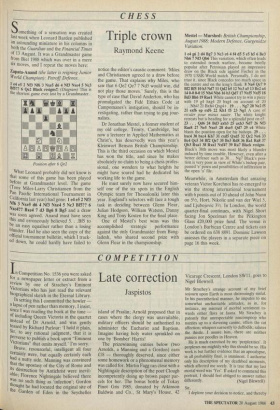CHESS
Triple crown
Raymond Keene
Something of a sensation was created last week when Leonard Barden published an astounding miniature in his columns in both the Guardian and the Financial Times of 13 August. It was a Grandmaster game from Biel 1988 which was over in a mere six moves, and I repeat the moves here: Zapata-Anand (the latter is reigning Junior World Champion): Petroff Defence.
l e4 e5 2 Nf3 Nf6 .3 Nxe5 d6 4 NO Nxe4 5 Nc3 FRS?? 6 Qe2 Black resigns!! (Diagram) This is the shortest game ever lost by a Grandmaster.
Position after 6 Qe2
What Leonard probably did not know is that some of this game has been played before at Grandmaster level. The game (Tony Miles-Larry Christiansen from the Pan Pacific International Tournament in California last year) had gone: 1 e4 e5 2 Nf3 Nf6 3 Nxe5 d6 4 Nf3 Nxe4 5 Nc3 Bf5?? 6 Nxe4?? Bxe4 7 d3 Bg6 8 Bg5 and a draw Was soon agreed. Anand must have seen this and erroneously believed 5. . .Bf5 to be an easy equaliser rather than a losing blunder. Had he also seen the copy of the official tournament bulletin, which I track- ed down, he could hardly have failed to notice the editor's caustic comment: 'Miles and Christiansen agreed to a draw before the game. That explains why Miles, who saw that 6 Qe2 Qe7 7 Nd5 would win, did not play those moves.' Surely, this is the type of case that David Anderton, who has promulgated the Fide Ethics Code at Campomanes's instigation, should be in- vestigating, rather than trying to gag jour- nalists.
Dr Jonathan Mestel, a former student of my old college, Trinity, Cambridge, but now a lecturer in Applied Mathematics at Christ's, has deservedly won this year's Kleinwort Benson British Championship. This is the third occasion on which Mestel has won the title, and since he makes absolutely no claim to being a ches profes- sional, one wonders to what heights he might have soared had he dedicated his working life to the game.
He must surely now have secured him- self one of the six spots in the English Olympic team for Thessaloniki later this year. England's selectors will face a tough task in deciding between Glenn Flear, Julian Hodgson, William Watson, Danny King and Tony kosten for the final place.
One of Mestel's best wins was this accomplished strategic perforrhance against the only Grandmaster from Bang- ladesh, who shared second prize with Glenn Flear in the championship. Mestel — Murshed: British Championship, August 1988; Modern Defence, Gurgenidze Variation.
1 e4 g6 2 d4 Bg7 3 Nc3 c6 4 f4 d5 5 e5 h5 6 Be3 Nh6 7 NO Qb6 This variation, which often leads to extended trench warfare, became briefly popular after Petrosian played an impressive draw on the Black side against Fischer in the 1970 USSR-World match. Personally, I do not trust it, since Black concedes too much space in the centre and on the king's flank. 8 Na4 Qc7 9 Bf2 Bf5 10 h3 Nd7 11 Qd2 b5 12 Nc3 a5 13 Bet a4 14 0-0 0-015 NM Nb6 16 b3 Qd7 17 NxfS Nxf5 18 Bd3 Bh6 19 Rael White cannot try to win a piece with 19 g4 hxg4 20 hxg4 on account of 20 . .
.Nh4! 21 Bxh4 Qxg4+. 19 . . . Ng7 20 Net f5 21 exf6 ep exf6 22 Kill f5 23 Ngl A case of reculer pour mieux sauter. The white knight retreats but is heading for a splendid post on e5. 23 . . . Qd6 24 Bd3 axb3 25 axb3 Nd7 26 Nf3 RaeS 27 Ne5 Nxe5 28 dxe5 Qd7 29 c4 White blasts the position open for his bishops. 29 . . . bxc4 30 bxc4 Kh7 31 cxd5 QxdS 32 Qc2 Ne6 33 Bc4 Qc5 34 Bf2 Qe7 35 Be3 Rd8 36 Ral Ra8 37 Qb3 Rxal 38 Rxal Nxf4? 39 Raj Black resigns. Black's 38th move was most likely a blunder induced by time trouble. However, even after a better defence such as 38... Ng7 Black's posi- tion is very poor in view of White's bishop pair, passed `e' pawn and possibilities of infiltration in the open 'a' file.
Meanwhile, in Amsterdam that amazing veteran Victor Korchnoi has re-emerged to win the strong international tournament with 6 points out of 10 ahead of John Nunn on 51/2, Hort, Nikolic and van der Wiel 5, and Ljubojevic 31/2. In London, the world quarter-final continues, with Nigel Short facing Jon Speelman for the Pilkington Glass £20,000 prize fund. The venue is London's Barbican Centre and tickets can be ordered on 638 8891. Dominic Lawson assesses the players in a separate piece on page 16 this week.






















































 Previous page
Previous page